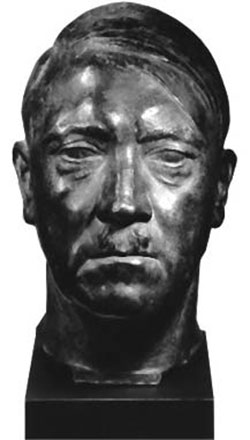 |
One of the common attitudes all fascist regimes have possessed is that concerning religion. At first glance, it would appear that all fascist regimes have supported the religion of their peoples. But, the fascists have not been sincere in this endeavor. Their only aim is to dupe their people and religious organizations. It makes no difference to fascists whether the religion in question is Islam, Christianity, Judaism, Buddhism or any other. It is sufficient that the religion is seen as enabling that society to bind together and to motivate people to work in the interests of fascism. When one examines the policies and practices of fascist dictators such as Hitler, Mussolini and Franco, and even such contemporary fascists as Saddam Hussein, the true face of their enmity towards religion can be clearly seen.
First of all, it is impossible for fascists to genuinely defend religion, because their character and principles are the exact opposite of the ethical foundation that religion instills in people. While the religion that God has chosen for mankind is one of peace and serenity, fascism consists of war and agitation. God commands pleasant speech, forgiveness and love, whereas fascists desire hatred and continual warfare. Therefore, fascists are not genuinely interested in seeing religion flourish, nor do they wish to see the ethics that accompany religion broadly disseminated, because, if this were to happen, then they will be unable to govern society according to their fascist ideals. For this reason, they seek to give the impression that they are committed to religion, although they also try to prevent its propagation through various measures and practices.
The history of the 20th century is full of such examples.
We have already examined the roots of Nazi ideology and its attitude to religion. As is shown in the examples we have considered, the Nazi ideology was perverse and opposed to all divine religions. The foundations of this ideology rest on Nietzsche's anti-religious philosophy, and Darwin's atheist theory of evolution which denies the fact of creation. The Nazis' perspective of ethics was in imitation of the pagan culture of ancient Greece and pre-Christian barbarian German tribes: Nazism was a pagan, idolatrous ideology.
This fact has been expressed by many commentators on the subject. In an article titled "Darwinism and the Nazi Race Holocaust," the American researcher Jerry Bergman describes the Nazis' view of religion as such,
Expunging of the Judeo-Christian doctrine of the divine origin of humans from mainline German (liberal) theology and its schools, and replacing it with Darwinism, openly contributed to the acceptance of Social Darwinism that culminated in the tragedy of the holocaust.102
Daniel Gasman, the author of The Scientific Origins of National Socialism, agrees:
[Hitler] stressed and singled out the idea of biological evolution as the most forceful weapon against traditional religion and he repeatedly condemned Christianity for its opposition to the teachings of evolution. For Hitler evolution was the hallmark of modern science and culture, and he defended its veracity as tenaciously as Haeckel.103
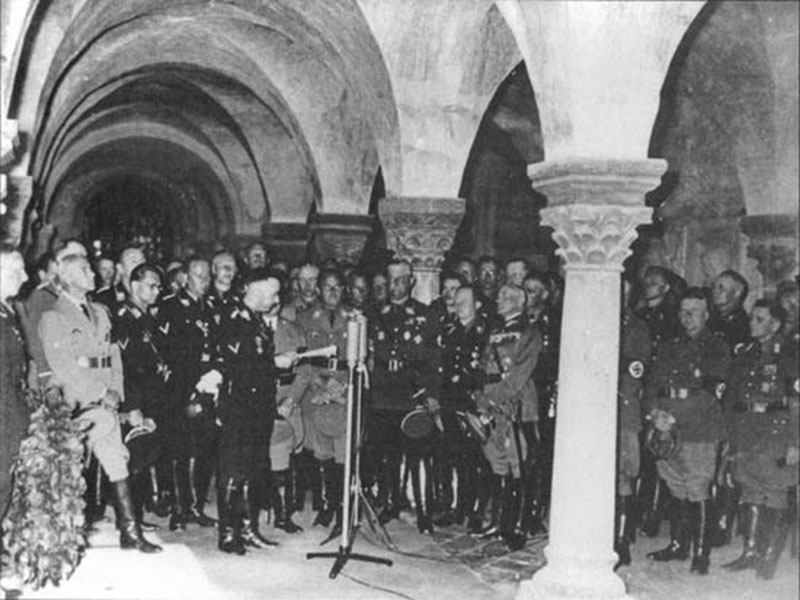 |
| SS Chief Himmler making a speech in a cathedral. This and other contrived "religious spectacles" were part of the effort by the Nazis, actual enemies of religion, to exploit it for their own political agendas. |
Hitler once revealed his hatred of religion when he bluntly stated that religion is an:
…organized lie [that] must be smashed. The State must remain the absolute master. When I was younger, I thought it was necessary to set about [destroying religion] …with dynamite. I've since realized there's room for a little subtlety... The final state must be… in St. Peter's Chair, a senile officiant; facing him a few sinister old women… The young and healthy are on our side… Our peoples had previously succeeded in living all right without this religion. I have six divisions of SS men absolutely indifferent in matters of religion. It doesn't prevent them from going to their death with serenity in their souls.104
As we have seen, the only notion Hitler considered necessary, on a spiritual level, was the understanding which leads people to "go to their death with serenity in their souls." This ideal was found in such pagan concepts as "the German soul," and "martial honor." He looked on divine religions, on the other hand, as beliefs that need to be "destroyed with dynamite."
Hitler summed up his views on religion to his staff at a meeting at his house in Oberzalsberg:
You see it's been our misfortune to have the wrong religion. Why didn't we have the religion of the Japanese, who regard sacrifice for the Fatherland as the highest good?105
This was Hitler's true opinion of religion. If religion had commanded war, as with that of the Japanese, then it could be accepted in order to be used for his own ends. But Christianity taught peace, not war, and personal sacrifice instead of selfishness and rivalry. For this reason, the Nazi Party waged a continuous war against the Catholic Church.
But it also tried to establish a "Christianity appropriate to Nazism."
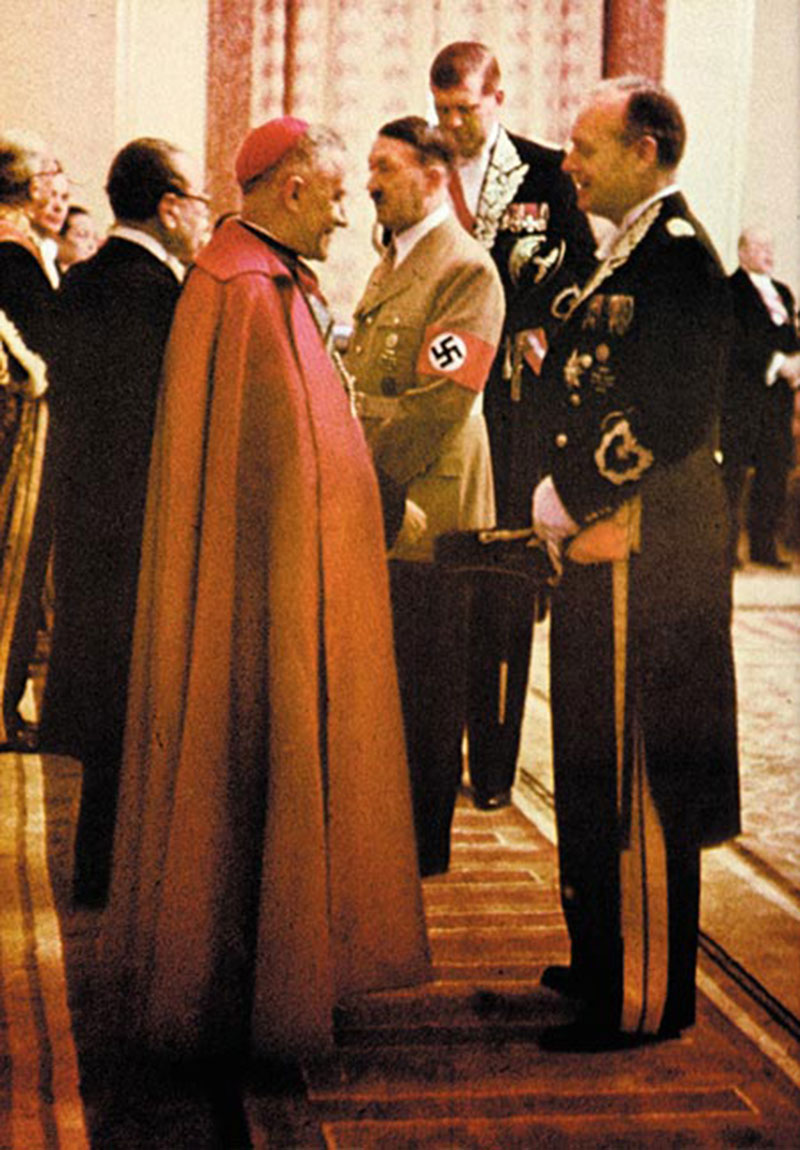 |
The Facade Of Religion |
| While Nazis were actually out to destroy Christianity, they had decided to manipulate it for their political ends. As the Church submitted to Nazi ideology, the Nazis donned false masks of religion. |
Although ultimately opposed to religion, in practice, the Nazis behaved diplomatically towards it. Their real aim was to use religious organizations as a tool to achieve their ends. Hitler was a particular enemy of the Catholic Church, which looked on all Christians as a supranational community. In its place, he intended to establish a church for Germans only, and by stages, to develop religion as a tool of German fascism. In a report entitled "The Nazi Party's Program and World View," the Nazi ideologist Gottfried Feder wrote:
Surely, some day the German people also will find a form for its perception and experience of God, a form dictated by its Nordic blood. Surely, only then will the trinity of blood, faith and state be complete.106
According to this perspective, it is necessary for religion to be in harmony with the ideals of "blood and state,' in other words with the Nazis' racist ideology. In Mein Kampf, Hitler summed up how religion was to be manipulated, "Anyone who wants to win the broad masses must know the key that opens the door to their heart."107
In order to appeal to various communities, Hitler used religious terms as this "key," and sought to portray racism as a sacred ideal. Though he was a Darwinist, that is, one who denies creation by a divine being, when formulating his racist propaganda, Hitler made reference to creation, although distorting the idea, to use it as a justification for racism. For example, in Mein Kampf, he said:
The result of all racial crossing is therefore in brief always the following: (a) Lowering of the level of higher race; (b) Physical and intellectual regression and hence the beginning of a slowly but surely progressing sickness. To bring about such a development is, then, nothing else but to sin against the will of the eternal creator.108
Peoples who bastardise themselves or let themselves be bastardised, sin against the will of eternal Providence, and when their ruin is encompassed by a stronger enemy it is not an injustice done to them, but only the restoration of justice.109
Nazism's distortion of religious ideas in this manner, and its use of them to serve its own racist ideology, were to some extent effective, with the opportunistic administrators of a number of German churches playing an important role in the strategy. These hypocritical men of religion, collaborating with Hitler, helped to disseminate Nazi propaganda in several ways. In 1933, when Hitler had only recently come to power, the president of the Union of Catholic Germans, Vice-Chancellor Franz von Papen, said in a speech on November 2, 1933, "The kind Lord has blessed Germany by giving it in times of deep distress a leader who will lead it, through all distresses and weaknesses, through all crisis and moment of danger, with the sure instinct of the statesman into a happy future."110 Some others had also praised Hitler as someone who was specially chosen to rescue Germany from its historical misfortune and lead it to a bright future.
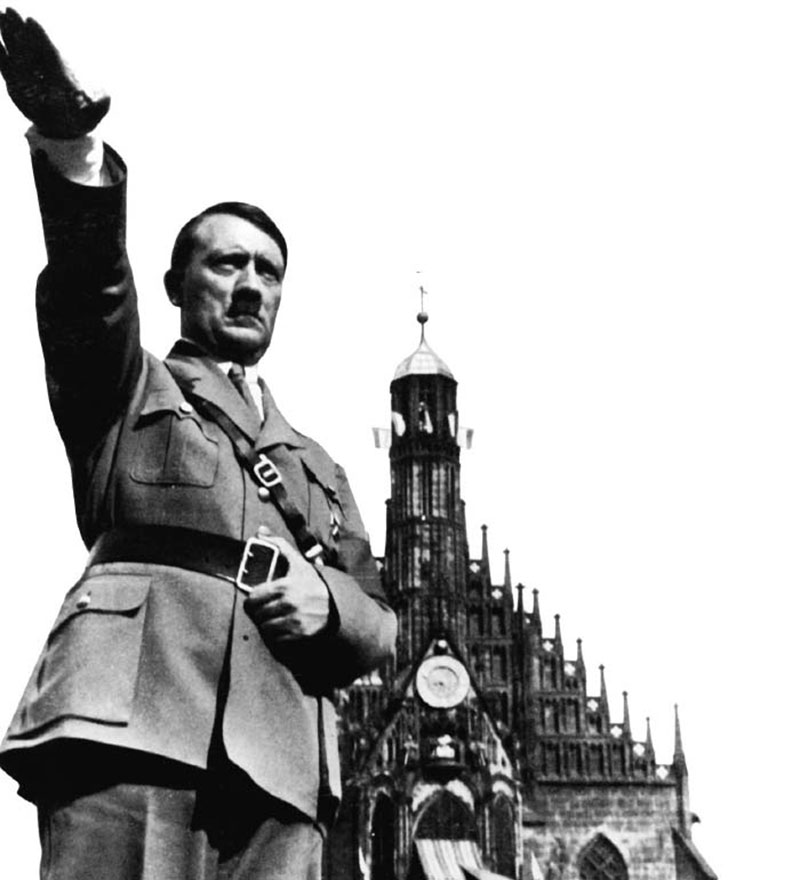 |
While the Nazis were duping some churches to collaborate with them, they tried to intimidate others through pressure and fear. In 1932, the Protestant clergyman Dietrich Bonhoeffer gave a sermon in Berlin on the subject of "the truth." He praised the importance of love as opposed to a racist system based on hatred. He was condemned to death by the Nazis because of this subversive attitude.
Between 1933 and 1939, a large number of Catholic priests were arrested. Erich Klausener, the leader of German Catholic Action, was killed in the purge of 1934. Catholic publications were banned. The Nazis also attacked a number of Protestant churches.
However, those among the clergy who abetted the Nazi ideology were rewarded. One of these was Dr. Hans Kerrl, Hitler's Minister for Church Affairs. In an address he gave to church leaders on February 13, 1937, Dr. Kerrl openly declared Christianity a tool of Nazi ideology, "The party stands on the basis of Positive Christianity, and Positive Christianity is National Socialism... National Socialism is the doing of God's will."111
At the end of 1937 and the beginning of 1938, Protestant clergymen, submitting to Nazi terrorism, took an oath of loyalty to Hitler, and thus sealed the surrender of the religious establishment. Hitler thereby enforced his domination over all spheres of life. Even the church was in his hands. But his real goal was to do away with all divine religions, and take Germany fully into paganism. In a secret decree dated June 1941, Nazis' aim of destroying religion was described in this way:
More and more the people must be separated from the churches and their organs, the pastors... Never again must an influence on leadership of the people be yielded to the churches. This influence must be broken completely and finally. Only the Reich government, and by its direction the Party, its components, and attached units, have a right to leadership of the people.112
In order to understand the Nazis' religious ideas and policies, we must examine their fanatical hostility to the Jews and Judaism.
The Nazis' anti-Semitism was a part of their hatred of religion. Because, according to Nazi logic, the Germans had first been a warrior-pagan society, until they had abandoned that culture with the spread of Christianity, a continuation of Judaism. The Nazis' hatred of Christianity stemmed from the fact they saw it as a "Jewish conspiracy." That the Prophet Jesus, himself of Jewish origins, should be loved and respected by the Germans, whom they considered the "master race," was an idea the Nazis found unacceptable. In the Nazis' opinion, it was not prophets of Jewish origin who should light the way for the German people, but the cruel and barbaric warriors of pagan German culture.
According to the Nazi ideology, the history of the world was seen as a conflict between the "Aryan race" and the "Semites." To the Nazis, the Aryan race was the leader of Indo-European culture, and the Semites (the Jews and Arabs) the leaders of Middle Eastern culture. The fundamental characteristic of Indo-European culture was its pagan belief system. It was for this reason that the Nazis saw themselves as the inheritors of paganism. They looked on the Jews as a hostile race who had abandoned paganism and spread monotheistic belief to the rest of the world.
The Pink Swastika, which discusses the Nazis' pagan ideologies, summarizes:
The reason why the Nazis first attacked the Jewish people and swore to exterminate them physically and spiritually is because the teachings of the Bible, both the Torah and the New Testament, represent the foundations on which the whole system of Christian ethics rests.113
This errant belief of the Nazis can be discerned in many other fascist movements as well. Many neo-fascist groups today hold pagan beliefs which they consider "the religion of the Aryan race," and bear a particular hatred of the revealed religions of Islam, Christianity, and Judaism, which they describe as "Semitic myth." Similarly, based on such deviant logic, fascist groups have emerged in the Islamic world and have tried to develop a new type of anti-Semitism in the form of "anti-Arabism."
However, the divine religion was not addressed solely to the Semitic races, but to everyone. Fascism, which denies the religion that God has revealed to mankind, and reveres the perverse paganism of its ancestors,is actually a great error. God mentions these errant people who turn to the "religion of their ancestors"in the Koran:
When they are told, "Follow what God has sent down to you," They say, "We are following what we found our fathers doing." What, even though their fathers did not understand a thing and were not guided! (Koran, 2:170)
Hitler's hypocritical policy towards religion was not a method restricted to Nazism, but is a general characteristic of fascist regimes. Religion is merely used as a tool by fascist ideologues, because they realize that they will be faced with a fierce reaction from people as a result of their cruelty and racist policies unless they disguise them in religious rhetoric. So, they distort religion to suit their own ends. They use the language and ideals of their society's religion, but when it comes to its implementation, a system very far removed from religion becomes recognizable.
The strategy is merely a policy designed by fascist leaders in order to unite their people under them, because they realize that people will be prepared to make all sorts of sacrifices in the name of religion, and are willing to endure a great deal for the sake of these lofty beliefs. So, they present themselves as acting in the name of God and religion. They seek to portray a religious image of themselves by exploiting the language and symbols of faith in their slogans, and propaganda. Hypocritically though, fascists carry out the great cruelties and inhumane acts which they believe to be necessary. In essence, what fascists practice and what they preach are totally opposed. The fascists' deceptive use of religion in this way and for their own power is merely another example of the extent of their malevolence.
God has this to say about those who use lies against Him:
Who could do greater wrong than those who invent lies against God? Such people will be arrayed before their Lord and the witnesses will say, "Those are the ones who lied against their Lord." Yes indeed! God's curse is on the wrongdoers.(Koran, 11:18)
On the other hand, those who are deceived by fascist slogans and influenced by their tactics are not to be perceived as sincere either. These people are rude and ignorant, with a poorly developed reasoning ability, who see religion merely as a legacy inherited from their ancestors. For this reason, they either fail to see or ignore the falsehood, depravity and lack of coherence by which the fascists employ religion.
As we have seen in the previous pages, fascists have used religion to effect in people the belief that racism and a Darwinist outlook on the world are proper and correct. But, this strategy merely again reveals the fascists' lack of intelligence. Because, it is obvious that religion does not support racism, nor competition or a struggle for survival among people. God has revealed that the only superiority between people lies in godliness, which is dependant on devotion, love and co-operation between people, and not on competition. However, fascists are only able to deceive the most ignorant sections of society with this false appearance of religion.
In order to analyze the fascist character, the second example that must be considered after Nazis, is the Italian dictator Mussolini, the true originator of the concept of "fascism." When we consider his career, we see in it a prime example of a hypocrite who bore a great hatred of religion, but who wore a mask of religion to suit his political ends.
Another truth revealed by Mussolini's career is that the line that divides communism from fascism is a very fine one, even though they might appear to be totally opposed ideologies. However, they are quite similar to each other, both being cruel, oppressive, totalitarian, oligarchic (based on minority rule) systems, exhibiting enmity towards religion, and espousing a Darwinian perspective of reality. (See Communism in Ambush by Harun Yahya, March 2001) So there is actually very little difference between a communist and a fascist, for one can very easily turn from one into the other. A communist who spills blood dreaming of a proletarian revolution can later begin to exhibit the same behavior for fascist ideals. Because violence is an indispensable element of both ideologies.
Mussolini spent years as an atheist communist, an enemy of religion and a fanatical Darwinist, trying to make a place for himself in Italian politics. When by these means he was not able to achieve his aims, he became a fascist.
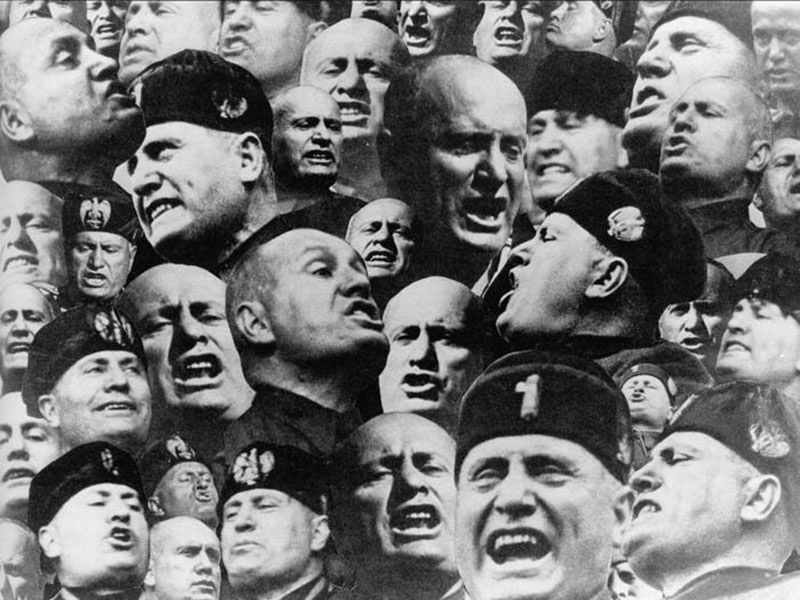 |
| In his youth, Mussolini was a communist, who longed for the "proletarian revolution," as well as an atheist who hated religion. He later changed his political leanings, eventually accepting "fascism." Under this new guise, and for political ends, he concealed his hatred of religion. |
Mussolini was born in a small village in 1883. His father was an avowed Marxist, an ideology he passed on to his son. According to the Oxford historian Denis Mack Smith, in his book Mussolini, "his father used to read parts of Das Kapital to the family."114
Mussolini received a communist education from his father, and was known at school as a difficult and aggressive boy, and a smart-aleck. He had almost no friends.
In his 20s Mussolini became a fanatical communist, supporting anarchism, an even more radical and fanatical revolutionary ideology than communism. Denis Mack Smith writes:
By 1903 he was calling himself an 'authoritarian communist'. From his father he had learnt to have little patience with sentimental, reformist socialism or with democratic and parliamentary methods; instead he preached revolution to expropriate a ruling class that would never voluntarily renounce power and possessions. Parliament should be abolished; class struggle must replace class collaboration; private property should disappear altogether. Socialists should never collaborate with bourgeois governments and never pursue a policy of strikes merely to get better wages, but should be ready to use terrorism and mob violence to affect a wholesale social revolution.115
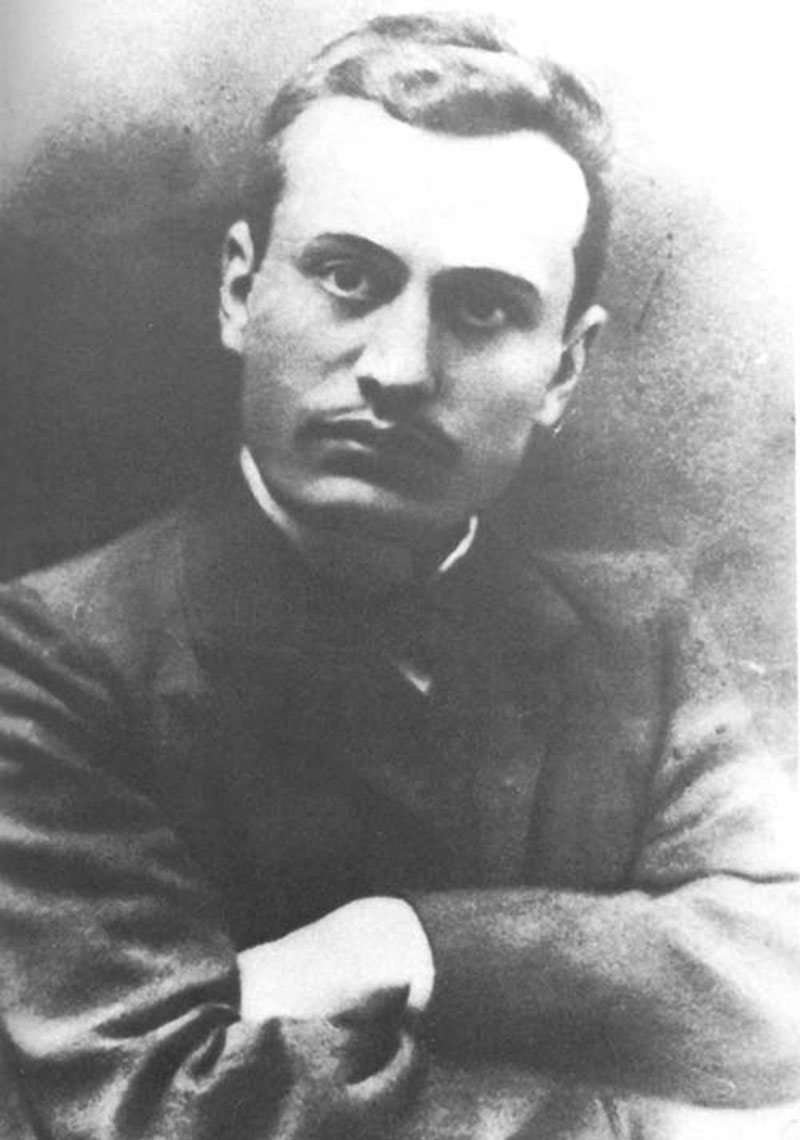 |
Aggression That Began with Communism and Ended with Fascism |
| The young Mussolini was editor of the communist weekly La Lotta di Classe (Class struggle). He placed pictures of Marx and Darwin on the cover, and frequently stressed his admiration of Lenin. When he became a fascist, however, he had all copies of the magazines assembled from libraries and destroyed. Nevertheless, Mussolini's character (aggressive, arrogant and paranoid) was always the same. |
As we have seen, in his youth Mussolini was a fanatical communist. The model of "revolution by violence and terror" closely resembled the terrorist methods of Lenin, which he would put into practice in Russia later on. Actually, Mussolini had established a relationship with Lenin during those years. According to his own later account, he met Lenin, who was in Switzerland at that time, and even won his approval.116 Mussolini emphasized his loyalty to Marxism by saying, "Marx was the greatest of all theorists of socialism" and frequently quoted from Marx in his writings.117
One of the defining characteristics of the communist Mussolini was a fanatical hatred of religion. Denis Mack Smith has this to say on the subject:
From his father he had learnt to be a thoroughgoing anti-clerical. He proclaimed himself to be an atheist...He forcibly denounced those socialists who thought religion a matter for individual conscience... Christianity in particular [he said] was vitiated by preaching the senseless virtues of resignation and cowardice, whereas the new socialist morality should celebrate violence and rebellion.118
It is important to make a careful estimation of Mussolini's state of mind as set out here. As we have seen, he revealed his hatred of and total lack of belief in God with open declaration of untruth about Him. As we shall soon see, Mussolini felt the need to support the Church the entire time he was in power, and so, sometimes portrayed himself as a religious man.
Furthermore, even during the years of his fanatical communism, he tried to wear a mask of religion. While he produced fanatically anti-religious writings and speeches in his own country, he invented a story about the depth and firmness of his religious beliefs when writing for an Anglo-Saxon audience.119
Mussolini's hatred of religion and his communist militancy lasted throughout the 1910s. In 1908, he wrote for the communist magazine La Lima under a false name, and thus clashed with the weekly Il Giornale Ligure, the publishing organ of the Catholics of Oneglia. The interesting thing is that after Mussolini came to power, the collection of La Lima in the local library disappeared mysteriously, because, after he came to power, he decided to use religion for political ends, and concealed his true face, his hatred of religion.120
Mussolini's devotion to communism was rooted in both his tendency to violence and personal psychological problems. Denis Mack Smith describes Mussolini's personality in these words:
Despite his continuing allegiance to Marx, there was little precise doctrine in his eclectic brand of socialism. He sometimes called himself a syndicalist, but in private spoke unkindly about most other socialists and to some acquaintances seemed above all an anarchist.121
Another historian who has studied Mussolini's life, Angelica Balabanoff, thought his views were "more the reflection of his early environment and his own rebellious egoism than the product of understanding and conviction; his hatred of oppression was not that impersonal hatred of a system shared by all revolutionaries; it sprang rather from his own sense of indignity and frustration, from a passion to assert his own ego and from a determination for personal revenge.''122
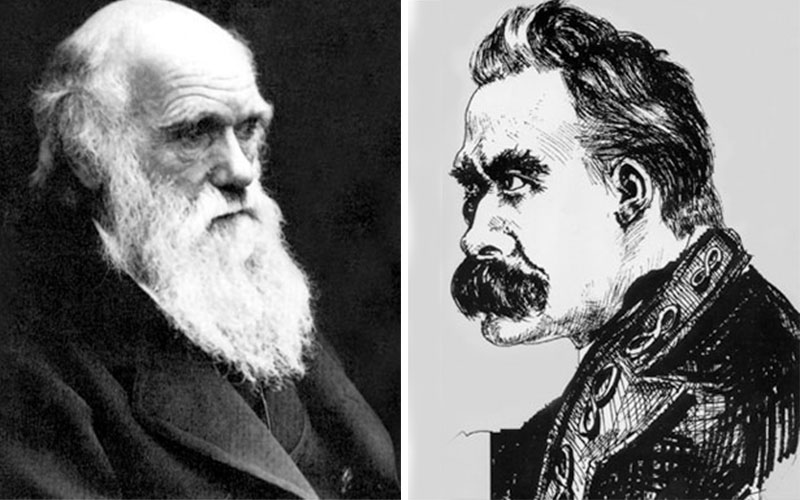 |
Mussolini's Mentors |
| Mussolini believed that war and conflict were indispensable to the development of a nation. Two figures instilled that idea in him, Charles Darwin and Friedrich Nietzsche. |
Actually, Mussolini's only definite beliefs were the principles of "conflict" and "war." These he had learned from the ideological founder of fascism, in other words, from Friedrich Nietzsche, and his mentor, Charles Darwin.
There is considerable evidence for the admiration Mussolini felt for them both. He admitted to his admiration for Nietzsche, whom he said filled him with a "spiritual eroticism."123 Denis Mack Smith writes:
In Nietzsche he found justification for his crusade against the Christian virtues of humility, resignation, charity, and goodness and it was also in Nietzsche that he found some of his favourite phrases including 'live dangerously', and 'the will to power'. Here, too, was the splendid concept of the superman, the supreme egoist who defied both God and the masses, who despised egalitarianism and democracy, who believed in the weakest going to the wall and pushing them if they did not go fast enough.124
Mussolini clearly referred to his ideological link with Darwinism in the pages of the communist weekly magazine La Lotta di Classe (Class Struggle), of which he was editor for a time. Pictures of Marx and Darwin were on the cover of the very first edition. The first issue of La Lotta di Classe referred to these two materialist ideologues as "The greatest thinkers of the past century," and was full of praise for Darwin's theory of evolution.125 Mussolini wrote a great deal for La Lotta di Classe on Darwinist, communist and anti-religious themes, but after 1922, in other words, after he came to power, all copies of this paper suddenly disappeared from local libraries.126
Mussolini underwent a sudden personal change at the end of the 1910s. After having been a radical communist for so long, he then emerged as the leader of the ideology known as "fascism" as it set out on its way to power. This movement took the "axe" of ancient Roman paganism as its symbol. However, Mussolini did not himself discover "fascism," but rather developed it from the racist trends which had been escalating in Italy during that period. But, even though he did not invent the ideology, he soon made it his own and turned it into a political movement. Just like Hitler, he gathered ignorant people around him, street thugs, adventurers, and instigators of violence. He grouped them together in a quasi-military organization known as the "Black Shirts," which he employed as a weapon of terror against his rivals. By these methods, he was able to seize power a few years later. By 1922 he was Italy's prime minister. Shortly afterwards, he began to be known by the term "Il Duce," or leader, and became an outright dictator.
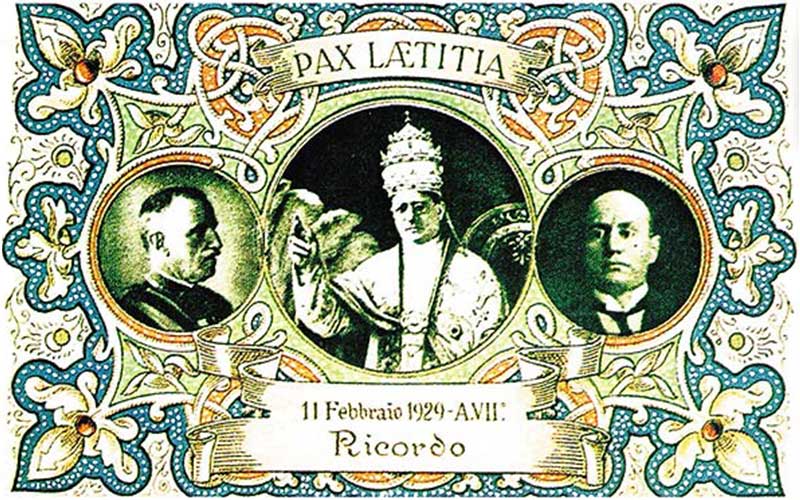 |
The Atheist Duce's Religious Mask |
| Although Mussolini had born a great hatred of God and religion since his childhood, after coming to power, he adopted a false mask of religion. His aim was to use religion to help bring about his dictatorship. Shortly thereafter,propaganda portraying him as the "sacred leader" began to appear. The above picture of Mussolini, "sanctified by the Pope," is such an example. |
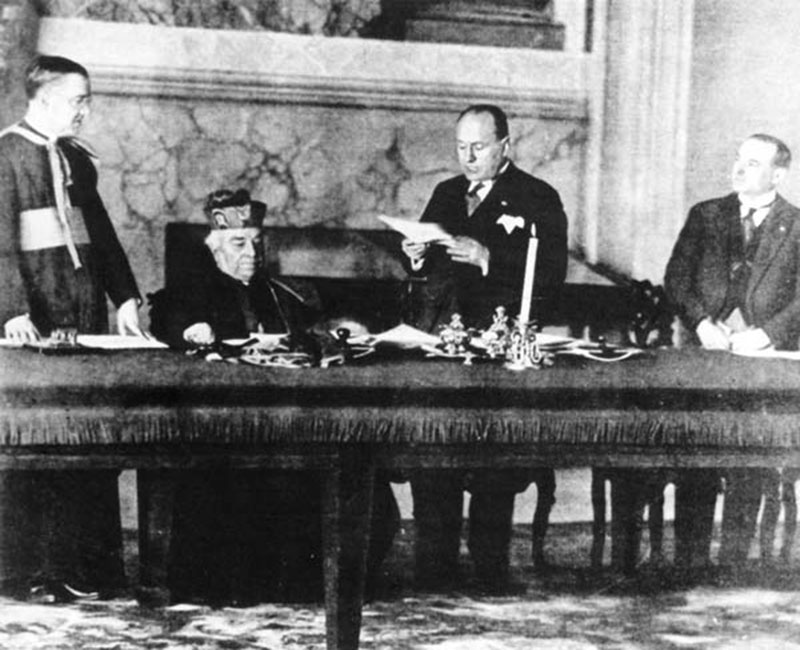 |
As Mussolini was emerging as the leader of fascism, he decided first to conceal his enmity towards religion, and even to appear as a devout Catholic. He made great efforts to create the image, particularly in the early years of his rule. On the one hand, he had all magazines in which he had written against religion collected and destroyed, while on the other, he made divinity lessons compulsory again after an absence of half a century, and decreed that pictures of the cross and the Virgin Mary should be hung in schools.127 He took great pains in all his speeches to come across as a religious, conservative figure, who was devoted to national customs and traditions. In Mussolini's new view, religion was an institution that owed the state its assistance in order that it should grow stronger.
Mussolini's hypocritical piety was effective, in as much as he won the support of the Church. His "conquest of the heart of the Church" was described in the Encyclopedia of Modern Leaders:
The Church's support for the fascists began with the election of the former Cardinal of Milan as Pope. In Pius XI's view, it was Mussolini who would rescue Italy from anarchy. Relations with Mussolini, who had once waged war against the Church in articles which he signed "A true atheist," and the pro-fascist Pope were always directed towards cooperation. The Vatican newspaper L'Osservatore Romano wrote in February 1923, "Mussolini has been applauded as the man who will restore the fortunes of Italy. This is a victory for religious traditions and national civilization." Cardinal Vicaire called upon the public to support the fascists in the same year. The Vatican withheld its approval of the Catholic Partito Popolare's [People's Party] anti-fascist attitude and had Don Sturzo removed from his post as party leader. In return for this, Mussolini demonstrated his respect for the Church at every available opportunity, staging a religious wedding ceremony for him and his wife, whom he had married 12 years before, and having his children baptized… In February 1929, he restored the Church's rights which had been taken away in 1870 by signing the "Lateran Pact" in the name of the King, with Cardinal Gaspari signing in the name of the Church. Under this agreement, the Church won complete freedom of belief and worship, and Catholicism became the official religion of the state. The Vatican was officially recognized and awarded considerable benefits, the Pope was recognized as head of the state and granted such rights as compensation payments to the papacy, the recognition of Church marriages, and religious lessons in primary schools. In return for these, the Pope awarded Mussolini the order of the "Golden Spur" in 1932, and described him as the "incomparable prime minister."128
But, despite these theatrics, Mussolini was nevertheless an atheist. Once having rallied Italian society behind him, he began to show his real aim, that of completely doing away with religion. In the 1930s, religious doctrines were slowly eliminated, and in their place a form of paganism that revered Mussolini as a divine being was put in place. Mussolini's only true religion was his egotism, which he tried little by little to make the Italians accept.
The slogan mentioned below, during this period, is a testament of the "cult dedicated to Mussolini": "Do not delay for an instant in loving God. But remember that the god of Italy is the Duce." 129
Mussolini belittled religious notions and re-interpreted them according to his own pagan belief system. The fact that he called the decrees and pronouncements he issued the "Fascist Decalogue," reveals the scale of his arrogance and hypocrisy.
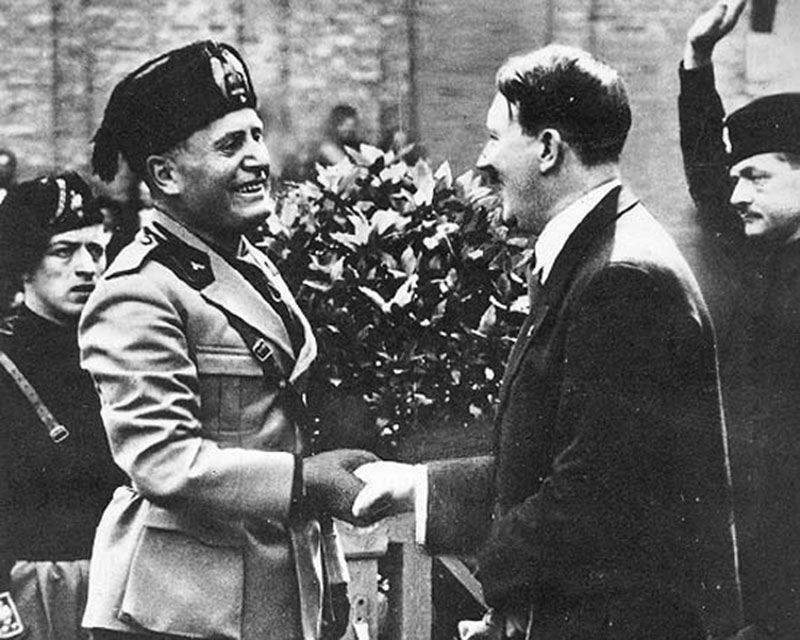 |
| Fascists hand in hand: Hitler and Mussolini |
However, Mussolini's arrogance did not endure long. Italy entered the Second World War on the side of Germany, but was defeated, collapsing much earlier than Germany. In 1943, Mussolini was arrested by his own countrymen and imprisoned. He was rescued with Hitler's support, and held out against the opposition in the North for some time longer. Towards the end of the war, he was once again arrested as he tried to cross the border in a German uniform, and was shot with his mistress at his side. His corpse was suspended by one foot in a square in Milan. Such was the dreadful end of a psychopath who claimed he was a "divine being."
As we have seen, fascism is an ideology fanatically opposed to religion, but which may sometimes conceal its hatred for political reasons, and even present itself as actually committed to religion. The aim behind fascists' wish to appear God-fearing is to pervert religious concepts from their true meaning, and employ them as tools for their political goals.
The degree of fascism's commitment to religion fluctuates according to the nature of the society it finds itself in. Nazism felt little need to put up such a front, because it had developed itself within German society, which had already been distanced far from religion. But, in Italy, Mussolini attempted to control a far more religious society, and thus felt a greater need to play such a hypocritical role. When we consider the example of Spain, we once again see a religious society and a fascism with a religious face. The leader of this brand of fascism was Francisco Franco.
Franco's ideology is known as "Falangism." The term comes from the word "Falange," (or the Falange Espanola Tradicionalista Y De Las Juntas De Ofensiva Nacional-Sindicalista, to give it its full name) which was founded in 1933. The party was established by a fascist ideologue called Jose Antonio Primo de Rivera, in imitation of Italian fascism, and was opposed to democracy, the Constitution, leftist movements and the Church. In fact, the word "Falange" (Phalanx in Spanish) was a martial concept taken from pagan cultures. The name referred to the arrangement of a regiment of soldiers, as practiced first in ancient Sumeria, and then in ancient Greece and Rome. General Franco, the commander-in-chief of the Spanish army at the time, took over control of the Falange party in 1936, when the civil war erupted as a result of fighting between right and left in the country. However, he softened the party's anti-religious stance, in an attempt to make his brand of fascism appear compatible with religion.
 |
Terrorism In Francos's Civil War |
| During the three-year bloody civil war waged in Spain by General Franco, hundreds of thousands of people lost their lives. Franco used all possible methods of terror against his opponents. Villages that did not assist his troops were bombed, mercilessly killing innocent people who had no interest in the war, and leaving tens of thousands of villagers homeless. |
| 1. A fighter in the Spanish Civil War being hit as he emerges from cover. |
Franco waged a particularly bloody civil war, not hesitating even to bomb civilians when he thought it necessary. He won the three-year war in 1939, and the dictatorship he set up afterwards lasted until the 1970s. In order to maintain the regime, he pursued policies to ensure the support of the Catholic Church. At the same time, the Church was given a capitalistic role in the economic life of the country. Franco's approach was always to defend the Church, and to use it for his own ends. On the other hand, all religious movements that emerged and that were outside fascist principles were ruthlessly suppressed by the government.
The book Who is Franco? What is Falangism? explains how Spanish fascism used religion in order to succeed:
Fascism needs the masses in order to attain its ends… It is sufficient to use words such as religious truths and monarchy to motivate the masses… Catholics were always powerful in Spain: Most priests are outspoken supporters of fascism… So it was necessary to find and publicize a theory of Spanish fascism. This was done by Gil Robles. Robles has close connections to Spain's greatest landowners. He was educated in Catholic Jesuit schools, and began his first political activities in these same organizations… When fascism came to power in Germany, Robles rushed there at once. His aim was to learn German working methods. Robles tried to imitate German fascism in a number of areas, but he was unable to put forward the "superior" and "Aryan race" theory. So what was Robles to do? He resorted to an extreme chauvinism, which he harmonized with Catholicism. "Spain comes before everything. God is above Spain. You are as Catholic as you feel yourself to be Spanish!" This Catholic chauvinism of Roble's came from various characteristics of Spain itself… Robles used Catholic bodies and cooperatives and Catholic youth groups. The Catholic press also entered the service of fascism. Robles also ran the newspaper El Debate, which was well-known among conservative circles.130
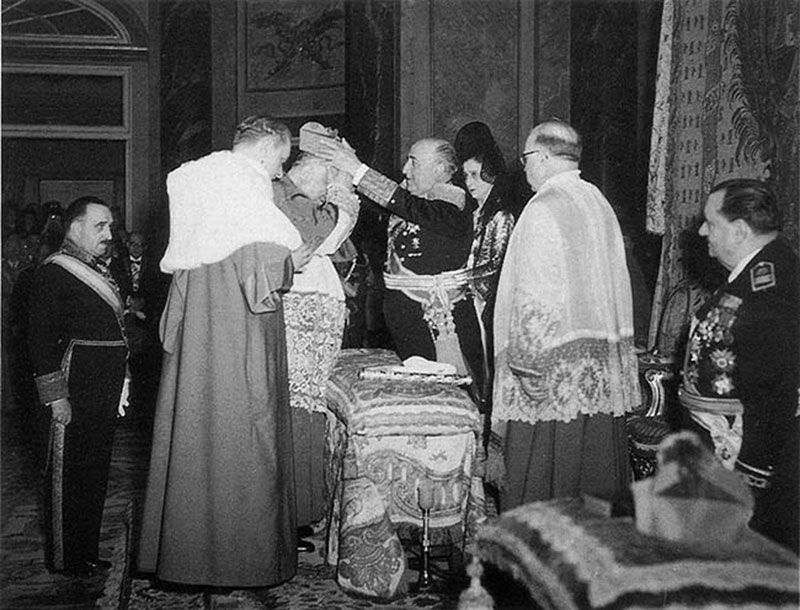 |
| Throughout his time in power, Franco forbade the development of any religious sentiments he may have considered at odds with the principles of the fascist state. He turned the Church away from its true principles, and made it a supporter of his fascist regime. |
The Destruction Wreaked by The Spanish Civil War |
 |
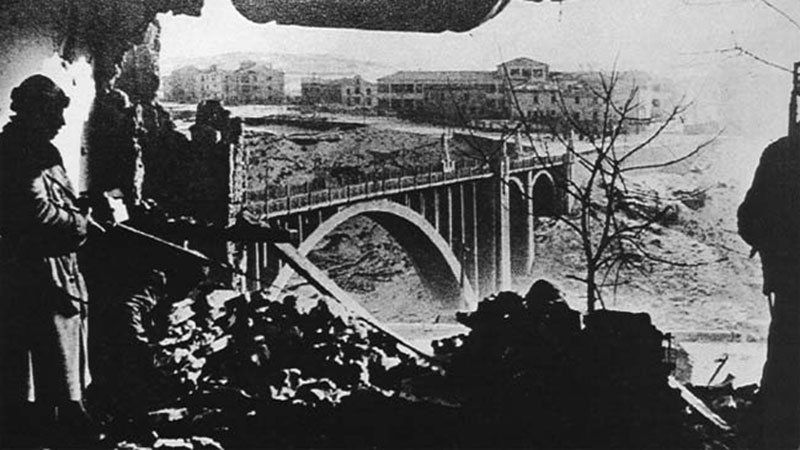 |
| Fascism regards "glory of victory" as a noble aim, one which justifies any cost. Between 1936 and 1939, Spain fell victim to this delusion. For the sake of winning the war, the head of the Spanish Army, Generalissimo Franco felt no qualms about devastating his country. (above) Large cities, such as Madrid and Barcelona, were bombed by Franco's forces. When celebrating his victory with his troops, Franco (right) felt no concern for all the innocent people he had killed in the process. |
The Church also served the fascists in other ways. Spaniards in Latin America and other fascist groups set up their own versions of the Falange, so these countries could be brought under Spanish control. The Catholic Church in these countries was a primary motivating force in this scheme.131
The story of how various fascist regimes came to power is generally very much the same. For fascists, religion is an important tool to help them achieve their ends. As a result of tactics similar to those employed in other fascist countries, the Church in Spain supported Franco. However, as we have already seen, fascists only maintain this positive attitude towards religion until they are in power, after which they generally lose no time waging war against it. The same happened in Spain.
George Orwell describes the situation in revolutionary Barcelona six months after the revolution:
Almost every church had been gutted and its images burnt. Churches here and there were being systematically demolished by gangs of workman.132
When we examine Franco as an example of how fascists openly use religion, we find ourselves once again face to face with one of the truths mentioned earlier in this book. Fascism is an ideology that seeks to turn European societies back to the pagan religions of pre-Christian Europe. And not just in Europe. Everywhere in the world the true religion of fascists has been paganism. Every fascist movement takes its own society's pagan beliefs as a model. Their slogans, symbols and the like, all bear the features of a particular society's pagan past. Fascists try to generate an emotional fervor in their peoples by referring to their ancestors and traditions, contributing to a kind of mass hypnosis. They continually promise a return to the "glorious days" of the peoples' past. Essentially, they turn fascism into a religion, employing religious terms and symbols from their societies' pasts. No matter how much they may give the impression of being religious, they are nothing more than pagans.
It is perfectly obvious that fascism has only ever led to bloodshed and suffering for mankind. The history of the 20th century is proof of this. But, despite this fact, there are still people in many parts of the world who are sympathetic to fascism. Fascist movements in our own time are spreading rapidly, under the name of neo-Nazis and hooligans. Legal measures taken against these fascist gangs are ineffective, where such powerful countries as Great Britain and Germany are unable to suppress them. This reason being that they use ineffective methods. It is impossible to restrain and bring into line people who have been brought up with no knowledge of religion, leading them to become utterly irresponsible, uncontrollable and aggressive. The only way to stop this aggression and terrorism that persists in many countries today, is to inoculate people with the morality taught by religion instead of the pagan or atheistic ideologies that are at the root of fascism.
As will be clear from the content of this book, fascism opposes peace, friendship, brotherhood, compromise and tolerance. The essence of religion, however, is good morality. So fascism is an ideology completely at variance with religion.
◉ For instance, fascism approves of racism. Fascists have always claimed that their own race or nation are superior to others, and have used the claim as an excuse to seize their lands and property. This racist claim results in countless wars, killings, and "ethnic cleansing." However, as we have seen, the Koran teaches that superiority is not subject to race, color or any other feature, but is founded in closeness to God and living by faith and proper morals. The Koran makes light of this truth:
Mankind! We created you from a male and female, and made you into peoples and tribes so that you might come to know each other. The noblest among you in God's sight is that one of you who best performs his duty. God is All-Knowing, All-Aware. (Koran, 49:13)
In another verse, God describes racism as the "fanatical rage of the time of ignorance", and reveals to believers that He will protect them against this provocative ideology:
Those who disbelieve filled their hearts with fanatical rage—the fanatical rage of the Time of Ignorance—and God sent down serenity to His Messenger and to the believers, and obliged them to respect the formula of heedfulness which they had most right to and were most entitled to. God has knowledge of all things. (Koran, 48:26)
As the above verse makes clear, God has divided people into different races and ethnic groups so that they may interact with one another and live in peace, brotherhood and tolerance. In other words, contrary to what fascists think, different races and ethnic groups are not a tool for Social Darwinist conflict and a "struggle for survival." There can be no question of biological superiority among different races and ethnic groups. God ascribes the only superiority among human beings to closeness to Him, and living according to faith and morality. In a situation where people adhere to the Koran, therefore, there will be no conflict of race, color or tribe, nor will such claims of superiority ever be able to find fertile ground in which to grow.
◉ History reveals that "fanatical rage" is a sickness that originated in pagan or atheist societies, where claims based on the superiority of a race, ethnic origin or tribe, and the conflict that results from them, have always existed. These people have always sought to determine their superiority in such physical features. The Koran however says, "All might belongs to God." (Koran, 10:65) Human beings are created by God with no distinction between race or skin color, but as helpless creatures utterly dependent on God. They will all someday die. So, no individual or society has the right to claim superiority over another. In death, these claims will be proven unfounded. A holy verse on the subject of the Day of Judgment reveals this fact:
Then when the Trumpet is blown, no ties of kinship will exist between them on that day, nor may they question one another.(Koran, 23:101)
A Terrible End |
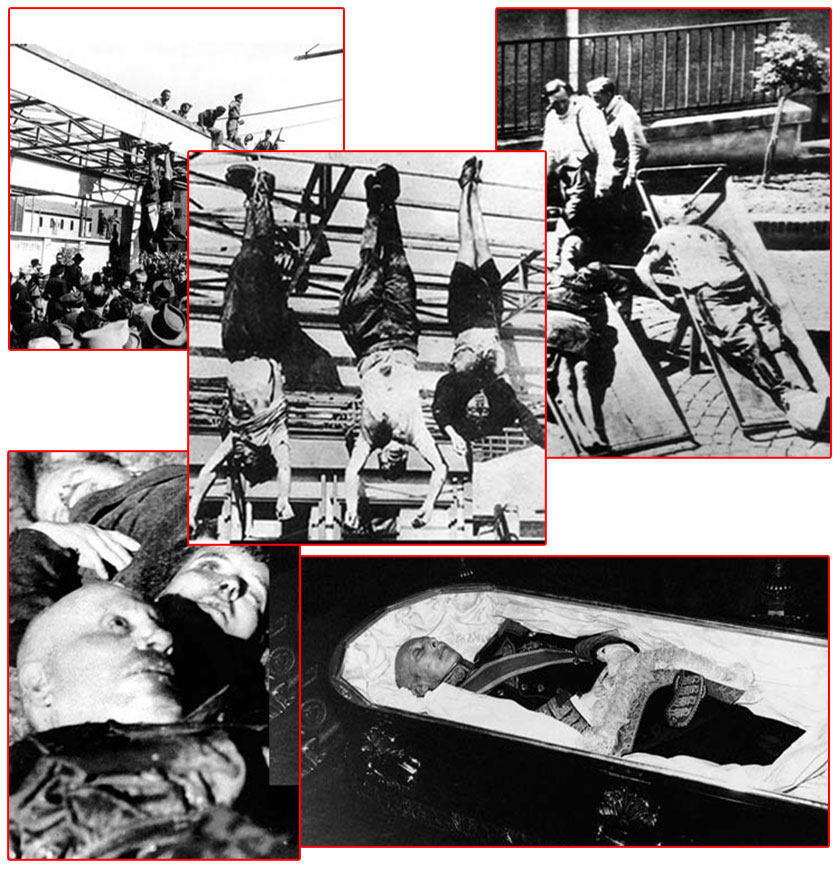 |
| Mussolini and his mistress were first lynched by the people, and then hung up by their feet in a square in Milan. |
As the verse makes clear, at the moment of death, the Day of Judgment or in the hereafter, concepts such as race, color and ethnic origin will be unimportant. The only thing of any importance then will be closeness to God and whether a person has won His mercy. On that day, nobody will be in a position to ask anyone about his race or ethnicity. Those people who are now passionate about their ethnicity, who kill others for it and even burn them alive, will understand how helpless and dependant they are, no matter what their race.
◉ Another distinguishing feature of fascism is its tendency to violence. Fascists regard violence, the use of brute force, war and conflict as sacred concepts. That is not possible for someone who lives by the Koran. God wants the faithful to live by good morals, which he describes in the Koran. For instance, a Muslim is charged with returning good for evil. God says this in one of the holy verses on the subject:
A good action and a bad action are not the same. Repel the bad with something better and, if there is enmity between you and someone else, he will be like a bosom friend.(Koran, 41:34)
It is out of the question for a person who behaves in accordance with the above verse to feel any sympathy for fascist logic and methods, or to show even the slightest tendency towards fascism.
◉ Another feature of fascist morality is that it is quite capable of sacrificing thousands of innocent people without hesitation for the sake of those aims that it perceives to be sacred. Fascists, who think that "the end justifies the means," carry out all kinds of brutality for an end that is in itself utterly unjustifiable. However, the Koran says that attacking people unjustly and killing the innocent is a great crime. According to fascism, human life is worth nothing, whereas religion sees the life of even one person as being of the utmost importance. God commands:
…if someone kills another person—unless it is in retaliation for someone else or for causing corruption in the earth—it is as if he had murdered all mankind. And if anyone gives life to another person, it is as if he had given life to all mankind… (Koran, 5:32)
Bearing in mind that killing an innocent person is like murdering all mankind, it is clear what a great sin all the killings, murders and genocide carried out by fascists has been. God reveals what awaits the cruel fascists in the hereafter:
There are only grounds against those who wrong people and act as tyrants in the earth without any right to do so. Such people will have a painful punishment.(Koran, 42:42)
◉ We also mentioned that fascists are excessively impassioned, for which reason they can easily be provoked, angered and incited to violence. Fascist groups tend to operate in the form of street gangs, become consumed with anger at even the slightest incident, and immediately resort to fighting at the slightest provocation. Naturally, this emotionally fuelled violence is completely contrary to what the Koran commands. The Koran speaks of intelligent, mild and moderate people who can restrain themselves when they become angry. Nothing that happens can make them aggressive or angry:
Those who give in times of both ease and hardship, those who control their rage and pardon other people—God loves the good-doers.(Koran, 3:134)
◉ Another tendency possessed by fascists is a group-mentality. Many poorly educated and ignorant young people in fascist groups, who do not even know why they do what they do, get carried away by a kind of hysterical emotion under the effect of crowds, slogans and martial songs. They get carried away by the herd mentality and involved in group crimes that they would never carry out of their own free will. They can attack a foreigner for no reason, or pillage a workplace. Most people who engage in such actions do so because they have become part of the "herd," just one part of the psychology of the group, because their wills and consciences are weak. But God warns people against the deviance of the majority:
If you obeyed most of those on earth, they would misguide you from God's Way. They follow nothing but conjecture. They are only guessing. (Koran, 6:116)
For this reason, instead of going along with the majority, the faithful act intelligently and according to their better conscience. This is only possible by living in accordance with the Koran.
◉ Another point of disparity between religion and fascism is the Koran's requirement of peace and compromise. These concepts are the exact opposite of fascism, which promotes aggression, conquest, war, brute force and oppression. God disapproves of all of these, presented in the Koran as cruelties. On the contrary, God commands people to live according to what is good and to establish good relations between each other:
There is no good in much of their secret talk, except in the case of those who enjoin charity, or what is right, or putting things right between people. If anyone does that, seeking the pleasure of God, We will give him an immense reward. (Koran, 4:114)
In conclusion, when we examine the basis of fascism, we come to see a system of ethics that is the exact opposite of those virtues that are inherent in religion, such as love, affection, compassion, humility, co-operation, and being content with what one has. However, fascism is a school of thought that systematizes the very opposite, and, under the influence of Darwinism, portrays itself as a "scientific" and rational approach. "Cruelty," which has always been condemned by religion, is praised and sanctified systematically in fascism.
This cruel and ruthless ideology has been the root of the genocidal acts carried out by Hitler, Mussolini's ruthless conquests, the bloody civil war waged by Franco, Pinochet's brutalities, Saddam Hussein's killing of 5,000 civilians by nerve gas, the inhumane savagery meted out to the Bosnians and Albanians by Milosevic, and many other current atrocities. The fascist ideology plays a role, not only in state-sponsored violence, such as mentioned above, but also in every-day instances. The stabbing, beating or killing of people because of a simple misunderstanding is the product of a culture that sees and portrays violence as a kind of heroism. The source this mentality is the influence of the idea of a "struggle for survival," once professed by such ideologues as Darwin and Nietzsche.
The cause of this sickness is the lack of religion in these people. They may perhaps claim to be religious if asked, but they have not the slightest inkling of the true beauty and nobility that religion bestows on people. And for the same reason, the cure for this sickness is for people to learn the true meaning of, as well as understand and live by, Koranic morality.
102. Jerry Bergman, "Darwinism and the Nazi race Holocaust," Creation Ex Nihilo Technical Journal, 13 (2): 101–111, 1999. 
103.Daniel Gasman, The Scientific Origins of National Socialism: Social Darwinism in Earnest Haeckel and the German Monist League, American Elsevier Press, New York, 1971, p. 168. 
104. Adolf Hitler, Hitler's Secret Conversations 1941–1944, With an introductory essay on The Mind of Adolf Hitler by H.R. Trevor-Roper, Farrar, Straus and Young, New York, p. 117, 1953, cited by Jerry Bergman, "Darwinism and the Nazi race Holocaust," Creation Ex Nihilo Technical Journal, 13 (2): 101–111, 1999 
105. Albert Speer, Inside the Third Reich, Bonanza Books, New York, p. 95 
106. Gottfried Feder, Das Programm der NSDAP und seine weltanschaulichen Grundlagen, p. 49; cited in Wilhelm Reich, The Mass Psychology of Fascism, Farrar, Straus and Giroux, New York, 2000, p. 117. 
107. Adolf Hitler, Mein Kampf, (Translated by Ralph Manheim), Pimlico, London, 1997, p. 306-307 
108. Adolf Hitler, Mein Kampf, (Translated by Ralph Manheim), Pimlico, London, 1997, p. 260. 
109. Adolf Hitler, Mein Kampf, (Translated by Ralph Manheim), Pimlico, London, 1997, p. 297 
110. The International Military Tribunal, Nuremberg, Nazi Conspiracy & Aggression, Office of United States Chief of Counsel For Prosecution of Axis Criminality, vol. II, p. 930. 
111. Stewart W. Herman, Jr., It's Your Souls We Want, AMS Press Inc., 1943, pp. 157-8. 
112. The International Military Tribunal, Nuremberg, The Trial of German Major War Criminals Sitting at Nuremberg, Germany, Session 2, November 21, 1945, (Part 4 of 8), p. 60. 
113. Scott Lively, Kevin Abrams, The Pink Swastika, Founders Publishing Corp., Oregon, 1997, Foreword, p. viii. 
114. Denis Mack Smith, Mussolini, Paladin Grafton Books, London, 1987, p. 2. 
115. Denis Mack Smith, Mussolini, Paladin Grafton Books, London, 1987, p. 8. 
116. Denis Mack Smith, Mussolini, Paladin Grafton Books, London, 1987, p. 8. 
117. Denis Mack Smith, Mussolini, Paladin Grafton Books, London, 1987, p. 8. 
118. Denis Mack Smith, Mussolini, Paladin Grafton Books, London, 1987, p. 9. 
119. Denis Mack Smith, Mussolini, Paladin Grafton Books, London, 1987, p.11 
120. Denis Mack Smith, Mussolini, Paladin Grafton Books, London, 1987, p.12. 
121. Denis Mack Smith, Mussolini, Paladin Grafton Books, London, 1987, p.13. 
122. Angelica Balabanoff, My Life as a Rebel, London, 1938, p. 60, cited in Denis Mack Smith, Mussolini, Paladin Grafton Books, London, 1987, p.13. 
123. Denis Mack Smith, Mussolini, Paladin Grafton Books, London, 1987, p.15. 
124. Denis Mack Smith, Mussolini, Paladin Grafton Books, London, 1987, p.15. 
125. Denis Mack Smith, Mussolini, Paladin Grafton Books, London, 1987, p.18. 
126.Denis Mack Smith, Mussolini, Paladin Grafton Books, London, 1987, p.17. 
127. Çağdaş Liderler Ansiklopedisi (Encyclopedia of Modern Leaders), Vol. 4, p. 1467. 
128.Çağdaş Liderler Ansiklopedisi (Encyclopedia of Modern Leaders), Vol. 4, p. 1469. 
129. Çağdaş Liderler Ansiklopedisi (Encyclopedia of Modern Leaders), Vol. 4, p. 1474. 
130. T. Kakınç, Franco Kimdir? Falanjizm Nedir? (Who is Franco? What is Falangism?), pp. 70-73. 
131. Charlie Hore, Duncan Hallas, Andy Durgan, İspanya 1936 Baharı (Spain 1936 Spring), Z yayınları, p. 26. 